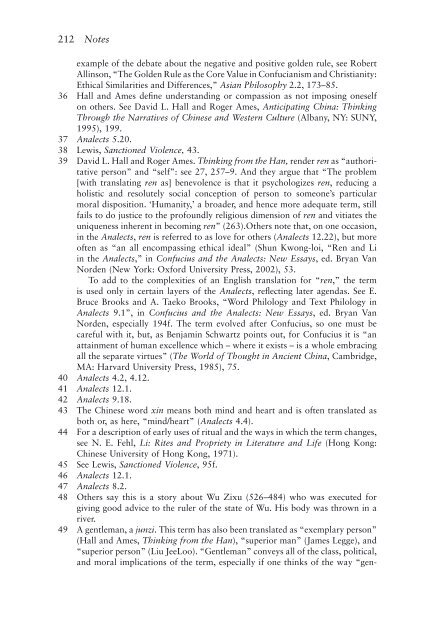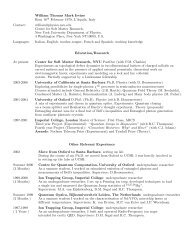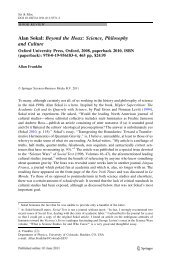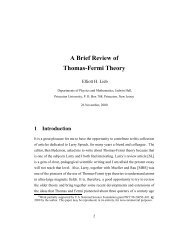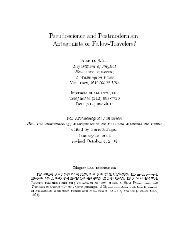Good Confucianism book (pdf) - Department of Physics
Good Confucianism book (pdf) - Department of Physics
Good Confucianism book (pdf) - Department of Physics
You also want an ePaper? Increase the reach of your titles
YUMPU automatically turns print PDFs into web optimized ePapers that Google loves.
212 Notesexample <strong>of</strong> the debate about the negative and positive golden rule, see RobertAllinson, “ The Golden Rule as the Core Value in <strong>Confucianism</strong> and Christianity:Ethical Similarities and Differences, ” Asian Philosophy 2.2, 173 – 85.36 Hall and Ames define understanding or compassion as not imposing oneselfon others. See David L. Hall and Roger Ames, Anticipating China: ThinkingThrough the Narratives <strong>of</strong> Chinese and Western Culture (Albany, NY: SUNY,1995 ), 199.37 Analects 5.20.38 Lewis, Sanctioned Violence, 43.39 David L. Hall and Roger Ames. Thinking from the Han, render ren as “ authoritativeperson ” and “ self ” : see 27, 257 – 9. And they argue that “ The problem[with translating ren as] benevolence is that it psychologizes ren , reducing aholistic and resolutely social conception <strong>of</strong> person to someone ’ s particularmoral disposition. ‘ Humanity, ’ a broader, and hence more adequate term, stillfails to do justice to the pr<strong>of</strong>oundly religious dimension <strong>of</strong> ren and vitiates theuniqueness inherent in becoming ren ” (263).Others note that, on one occasion,in the Analects , ren is referred to as love for others ( Analects 12.22), but more<strong>of</strong>ten as “ an all encompassing ethical ideal ” (Shun Kwong - loi, “ Ren and Liin the Analects , ” in Confucius and the Analects: New Essays , ed. Bryan VanNorden (New York: Oxford University Press, 2002 ), 53.To add to the complexities <strong>of</strong> an English translation for “ ren , ” the termis used only in certain layers <strong>of</strong> the Analects , reflecting later agendas. See E.Bruce Brooks and A. Taeko Brooks, “ Word Philology and Text Philology inAnalects 9.1 ” , in Confucius and the Analects: New Essays , ed. Bryan VanNorden, especially 194f. The term evolved after Confucius, so one must becareful with it, but, as Benjamin Schwartz points out, for Confucius it is “ anattainment <strong>of</strong> human excellence which – where it exists – is a whole embracingall the separate virtues ” ( The World <strong>of</strong> Thought in Ancient China , Cambridge,MA: Harvard University Press, 1985 ), 75.40 Analects 4.2, 4.12.41 Analects 12.1.42 Analects 9.18.43 The Chinese word xin means both mind and heart and is <strong>of</strong>ten translated asboth or, as here, “ mind/heart ” ( Analects 4.4).44 For a description <strong>of</strong> early uses <strong>of</strong> ritual and the ways in which the term changes,see N. E. Fehl, Li: Rites and Propriety in Literature and Life (Hong Kong:Chinese University <strong>of</strong> Hong Kong, 1971).45 See Lewis, Sanctioned Violence , 95f.46 Analects 12.1.47 Analects 8.2.48 Others say this is a story about Wu Zixu (526 – 484) who was executed forgiving good advice to the ruler <strong>of</strong> the state <strong>of</strong> Wu. His body was thrown in ariver.49 A gentleman, a junzi . This term has also been translated as “ exemplary person ”(Hall and Ames, Thinking from the Han ), “ superior man ” (James Legge), and“ superior person ” (Liu JeeLoo). “ Gentleman ” conveys all <strong>of</strong> the class, political,and moral implications <strong>of</strong> the term, especially if one thinks <strong>of</strong> the way “ gen-


